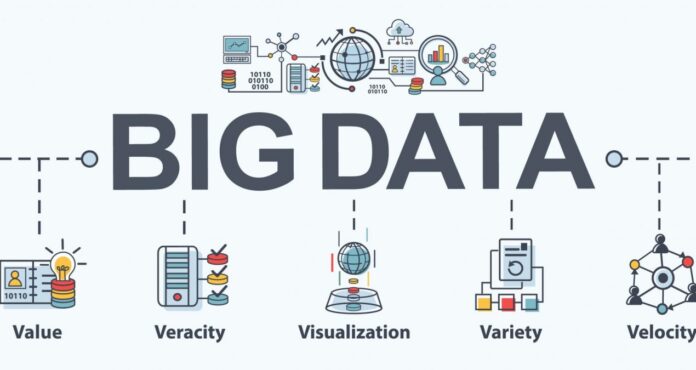Businesses are always looking for methods to optimize their service delivery. The decision-making process is primarily enabled by the information gathered from customers and while internal activities are performed. As we live in the age of information, accumulating Big Data is a non-negotiable aspect of the business world. When mishandled, Big Data can cost businesses 35% of the revenue used to run operations.
This is why a well-trained professional is always advised to spearhead project execution. Individuals with a PMP Certification (project management professional) are equipped with the necessary skills to ensure Big Data management processes are aligned with project completion goals and, as a result, aligned with the overall organizational mission and vision.
What is Big Data?
Big Data covers three kinds of large-scale information and data systems; structured, unstructured, and semi-structured. The information is consistently growing and categorized by three V’s; Volume of the data, the Velocity at which the data is collected, and the Variety of categories covered by the data. Big Data is a valuable asset across all departments within an organization. However, without adequate categorization and filtering, the sheer size of the information can be hard to manage.
Big Data is primarily collected from information available to the public, e.g., on social media networks or websites, through electronic check-ins at various locations, and through questionnaires, applications, and product purchases. Big Data is predominantly kept in computer databases with specific software to sift through the large, complex pools of information.
Data analysts and other professionals in the field can correlate the data, such as demographics, to determine their impact on activities. This is conducted by a third-party organization with expertise in data mining and offering meaningful information to smaller businesses. For larger corporations, moving these activities in-house can be both cost-effective and help make decisions faster.
Processing Big Data is strongly beneficial to all organizations. Information on potential and existing customers that may not have been considered comes to light; as a result, better business decisions can be made.
What is Project Management?
Project management describes the process of handling and organizing the multiple revenue-generating activities a business undertakes. A project is a set of activities with a start and end date. With every project being unique, the requirements in scope and resources change along with the business goals worked towards acceptance of the project and its completion.
Project managers are professionals hired with the intention of streamlining this process. They offer a palatable plan to execute the required activities while capitalizing on their abilities, knowledge banks, techniques, and tools for maximum efficiency and effectiveness.
Project management widely follows a five-step process;
- Initiation
- Planning
- Execution
- Monitoring and Control Measures
- Closing
To piece these components together, project management professionals must understand the need for integration, the project’s scope, the time needed for execution, overall investment requirements, the quality of materials used and output, and how raw materials and other components must be procured. Additionally, the staff needed must be discussed with human resources, and clear lines of communication between all functional teams must be established. Risk and stakeholder management are non-negotiable parts of this process. Risk management helps the business understand where buffers must be placed to ensure the project is completed. It also allows businesses to understand prospective inhibitors to future projects and accounts for them during the planning part of new projects. Stakeholder management is just as critical. The project directly impacts stakeholders as it is conducted and after its completion. Understanding what stakeholders need and how to achieve the same helps maintain a healthy corporate culture and align with its mission and vision.
Benefits
Making better project management decisions comes from expertise and further intelligence provided by internal and external activities. Introducing Big Data into the system can prove quite beneficial to businesses by;
- Improving all-round Project Intelligence
Maximizing existing tools is simpler with the introduction of Big Data. In addition, Big Data allows project managers to access more information translating down to more informed decision-making and better all-around performance.
- Lower Overall Project Costings
Big Data helps project managers pick up on future industry trends and events. With this information forecasting, resource allocation is more efficient and effective, allowing for better distribution planning. Additionally, teams handling specific project activities are offered full information as a guideline allowing for stronger and more accurate execution.
- Introduce Efficiency
With the information Big Data provides about the success of internal activities, processes, and the provision of products/services, organizations can detect and understand concerns faster. As a result, the project currently being worked on is likely to be completed with enhanced efficiency, and the organization continues to work at optimal capacity.
- Streamline Resource Management
A finite amount of resources (time, material, and staff) are allocated to each project undertaking. To understand how to distribute the same aptly, Big Data offers insight. With the numerous activities that occur during a single project, businesses could use Big Data processing tied up with a resource management system to understand where project plans could change and whether the outcome is still desirable. These nuances offer savings for the organization and help reduce waste.
Conclusion
Big Data has enhanced a business’s ability to make better and more accurate decisions. Without capitalizing on the same in a way beneficial to an organization, competition will likely overtake. Any organization looking to offer a more meaningful experience to their customers must look into the adequate processing of Big Data.
Especially within the project management field, the insight offered could change the outcome of a project in a largely positive way. A well-educated professional at the helm of incorporating Big Data into project management could change how a business looks at its activities.






















